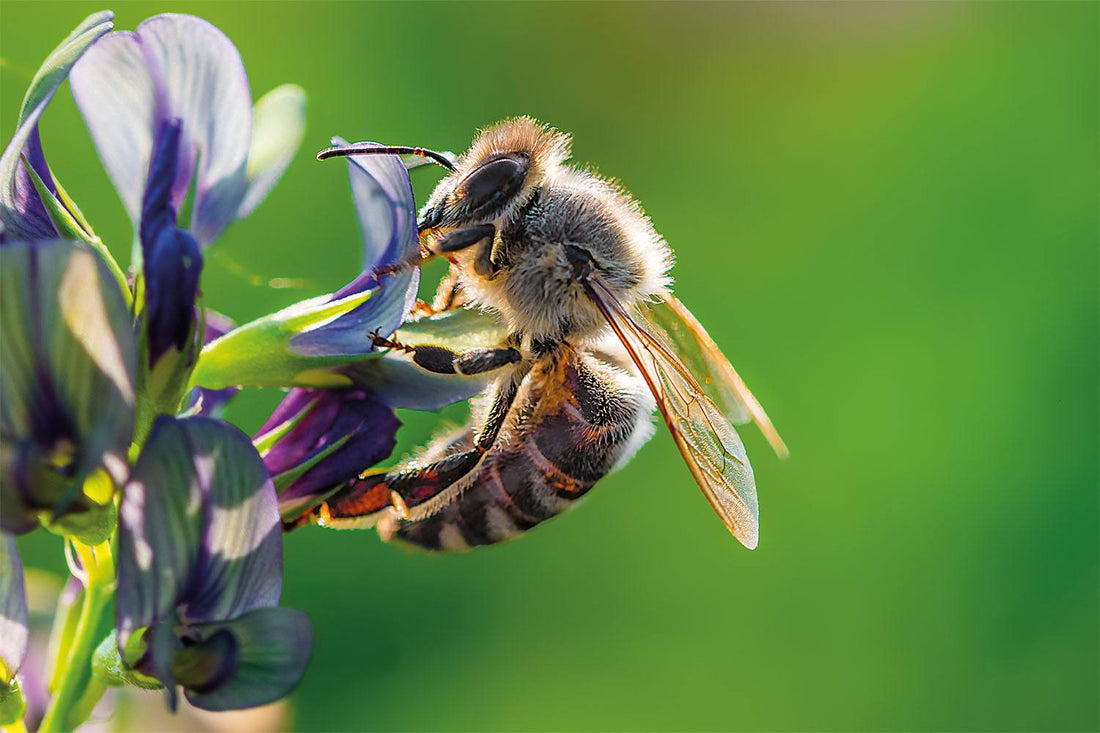
If you think you're busy consider the bees
Share
Bees are some of the hardest workers on the planet. One bee can have to fly about 90,000 miles – three times around the globe - to make just one pound of honey.
For centuries we have recognised the importance of bees to our world and now on World Bee Day, we take a look at what bees do for us and what we can do for them.
The initial idea to celebrate World Bee Day originated in Slovenia and was selected as it was the birthday of the great 18th-century bee expert, Anton Janša.
Janša was the pioneer of modern beekeeping and introduced bee-keeping methods that caused a real revolution at the time and are still used by beekeepers today.
We all know that bees produce honey, but did you know that bees also help to feed the world? And it's not just with their honey.
- Bees pollinate 80 percent of all flowering plants, including more than 130 types of fruits and vegetables.
- Every third spoonful of food in the world relies on pollination.
- One-third of the world's food production depends on bees.
- Bees pollinate 75% of all leading global crops.
- Bees are responsible for pollinating $15 billion worth of just US crops and 200 million pounds of UK crops.
- Bees pollinate the crops that our animals eat.
- Bees are a fantastic symbol of nature. If they are thriving it shows that our natural environment is in good shape.
- 80% of European wildflowers require insect pollination. Many rely on bees; this keeps the countryside colourful and provides food for many creatures.
- A single bee colony can pollinate 300 million flowers in a day.
We rely on bees for our food. According to research 75% of all crops depend on pollinators and a third of the world’s food supply relies on bees. However, bees are under threat and the bee population is declining. Here are some scary facts:
- There’s a 2.96 million decline in honeybee colonies over the years in the US.
- US beekeepers lost an average of 40% of their honeybee colonies in 2018
- The bee population in 2019 consisted primarily of wild bees
- Some bee species in the UK have become entirely extinct
- One million species of bees worldwide are facing extinction
- Today, the United Nations says that Bees have become increasingly endangered, with one million species facing extinction. That would mean far fewer apples, soft fruits, beans, tomatoes and more.
But, what is happening to the bees, why are their numbers declining?
- Habitat loss – since the second world war, we have lost 97% of our wildflower meadows. This means less diverse food for the bees and fewer places for them to feed.
- Intensive farming – with all space used to grow crops, traditional bee habitats at the edges of fields have been lost.
- Climate change - as winters are warmer and seasons shift, wildlife often gets confused. For example, bees may become active when flowers are not yet ready or when apples are not ready to pollinate.
- Pesticides - Scientists have found that exposure to pesticides can impair honeybees' ability to navigate, bumblebees' ability to reproduce and solitary bees' ability to reproduce any young at all. The use of herbicides in public places reduces the availability of plants that bees seek out for food.
- Invading species – species that are not native can have devastating effects for example the Asian Hornet, which recently arrived in the UK, could devastate British bee species if they took hold.
- Combination - there is evidence to show that the above can all work in combination, a hungry bee that is then affected by bad weather who ingests some pesticides, is unlikely to do very well!
Given how vital bees are to our food source, environment and economy, we all must do what we can to help the bees. Here are some ideas:
- Plant flowers, wherever you can, to provide nectar. Balconies, terraces, gardens and pots all work.
- Support your local beekeepers by buying their honey and other hive products.
- Offer locations for the bees to live, if you have land for a hive.
- Use pesticides that do not harm bees, and spray them in windless weather, either early in the morning or late at night, when bees are not around.
- Raise awareness among youngsters on the importance of bees.
- Preserve old meadows – or allow a new one to grow– and sow nectar-bearing plants.
- Cut grass on meadows only after the plants have finished blooming.
- Leave a small dish with a few pebbles and water outside to help thirsty bees.
- If you have a garden, stop using harmful pesticides and let it grow a bit before tidying.
Now is the time to think Bee- these tiny hard workers support our food chain and help feed the world- let's support them so that they in turn can support us.
Our organic wheatgrass juice is grown outdoors in organic soil, using traditional farming methods, allowing wildflowers and wildlife to flourish. To order your organic superfood juice, visit our shop today.

